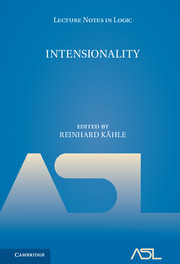Book contents
- Frontmatter
- Preface
- Contents
- The modal aether
- Possible worlds semantics for predicates
- A context principle
- The semantics of modal predicate logic II. Modal individuals revisited
- Intensionality and coercion
- Intensionality in philosophy andmetamathematics
- Representation theorem for models of dynamic intensional logic
- Intension, intention
- Modality, mood, and descriptions
- Coercion vs. indeterminacy in opaque verbs
- References
A context principle
Published online by Cambridge University Press: 30 March 2017
- Frontmatter
- Preface
- Contents
- The modal aether
- Possible worlds semantics for predicates
- A context principle
- The semantics of modal predicate logic II. Modal individuals revisited
- Intensionality and coercion
- Intensionality in philosophy andmetamathematics
- Representation theorem for models of dynamic intensional logic
- Intension, intention
- Modality, mood, and descriptions
- Coercion vs. indeterminacy in opaque verbs
- References
Summary
Abstract. Starting from any language provided with sentence meanings and a grammar, and using the principle that the meaning of a phrase is what it contributes to the meanings of sentences containing it, we derive a semantics for the whole language. The semantics is necessarily compositional and carries a structure of semantic categories. With a further assumption on the grammatical heads of phrases, we can assume that the meanings of head words are functions from meanings to meanings, in the Frege style. The paper sketches these results and considers how far the semantics of Husserl, Frege and Tarski can be seen as examples of this pattern.
When Alfred Tarski wrote his famous definition of truth [20] (1933) for a formal language, he had several stated aims. His chief aim was to define truth of sentences. Giving correct meanings of other expressions of the language was nowhere in his list of aims at all; it was a happy accident that a general semantics fell out of his truth definition.
So the following facts, all very easily proved, came to me as a surprise. Given any notion of meaning for sentences (for example, a specification of when they are true and when not), and assuming some simple book-keeping conditions, there is a canonical way of extending this notion to a semantics for the whole language. I call it the fregean extension; it is determined up to the question which pairs of expressions have the same meaning. Tarski's semantics for first-order logic is the fregean extension of the truth conditions for sentences. Afewmore book-keeping conditions guarantee that the fregean extension can be chosen to have good functional properties of the kind often associated with Frege and with type-theoretic semantics.
Tarski himselfwas certainly interested in the question howfar his solution of his problem was canonical, and we can learn useful things from his discussion of the issue. But the main results below on fregean extensions come closer to the linguistic and logical concerns of Frege and Husserl, a generation earlier than Tarski. Husserl has been unjustly neglected by logicians, and Frege's innovations in linguistics deserve to be better known.
- Type
- Chapter
- Information
- Intensionality , pp. 42 - 59Publisher: Cambridge University PressPrint publication year: 2005
References
- 1
- Cited by



